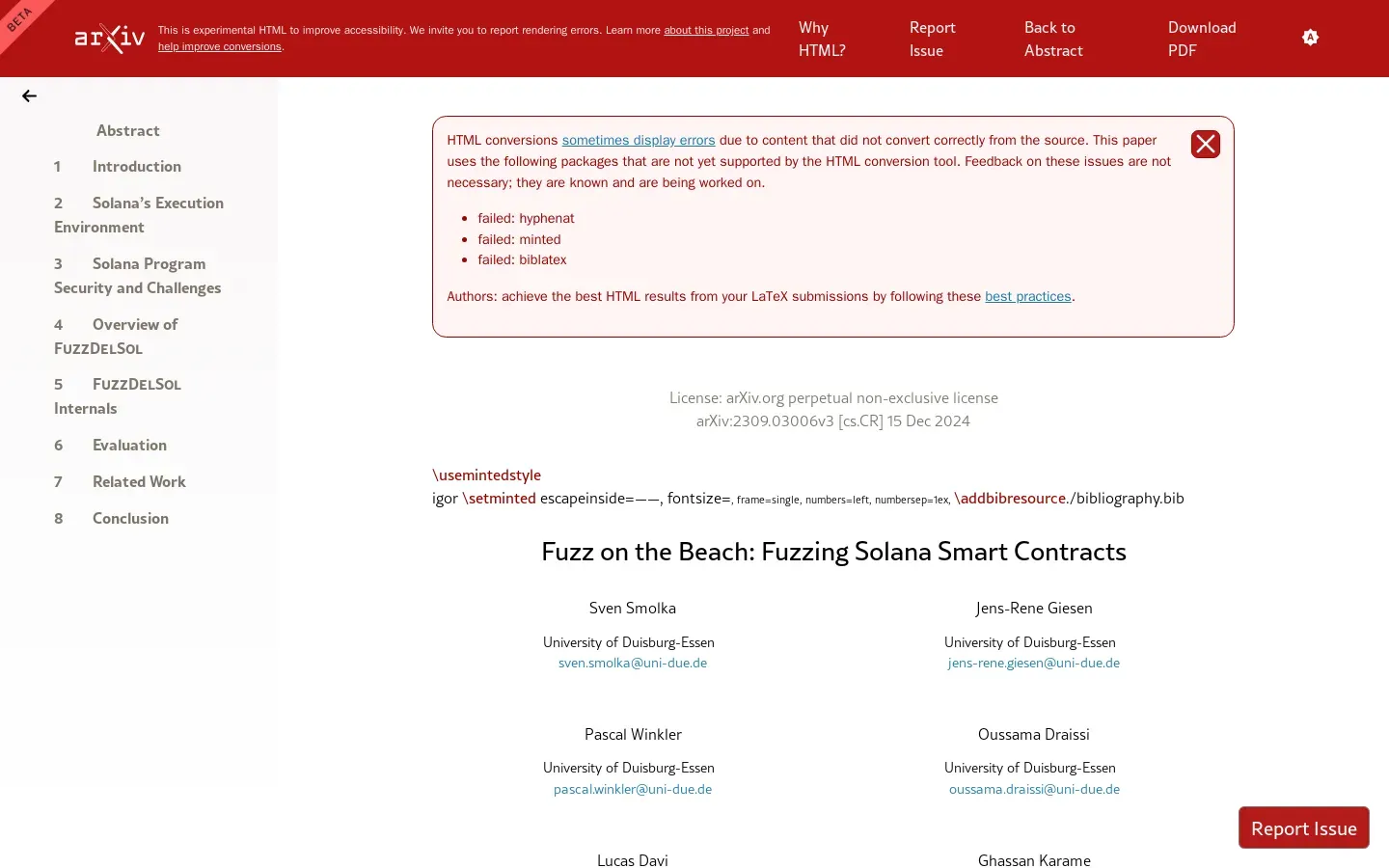
Advancements in Solana Smart Contract Security Through FuzzDelSol
/ 4 min read
Quick take - Recent research has introduced FuzzDelSol, a novel fuzzing architecture designed to enhance the security of Solana smart contracts by improving vulnerability detection and supporting developers in maintaining robust security standards.
Fast Facts
- FuzzDelSol Development: A new fuzzing architecture designed to enhance the security of Solana smart contracts by identifying vulnerabilities more effectively.
- Key Research Objectives: Focused on creating a blockchain emulator, generating valid transactions, executing within Solana’s runtime, and understanding vulnerabilities related to program-derived addresses (PDAs).
- Enhanced Detection and Awareness: The research led to improved vulnerability detection and a better understanding of Solana-specific security issues, necessitating a shift in security analysis frameworks.
- Automated Tools for Security: Development of automated auditing tools is crucial for improving the security landscape of Solana applications and ensuring regulatory compliance.
- Future Directions: Recommendations include integrating continuous monitoring tools, creating a vulnerability database, assessing cross-chain vulnerabilities, and enhancing fuzzing techniques with machine learning.
Advancements in Security for Solana Smart Contracts: A Deep Dive into FuzzDelSol
Recent research has unveiled significant advancements in the security of Solana smart contracts through a novel fuzzing architecture known as FuzzDelSol. This initiative aims to bolster the resilience of Solana’s unique blockchain architecture against vulnerabilities, supporting developers and regulatory bodies in maintaining robust security standards.
Key Objectives of the Research
The primary objectives of this research focused on several critical areas:
-
Blockchain Emulator Development: The project aimed to create a valid ledger snapshot that accurately reflects the state of the blockchain for testing purposes. This emulator serves as a crucial tool for developers to simulate real-world conditions and identify potential vulnerabilities.
-
Transaction Generation: Researchers sought to produce valid and reproducible Solana transactions for fuzz testing. This ensures that the testing process is both comprehensive and reliable, allowing for a thorough examination of potential security flaws.
-
Execution in RunDelSol: Efficient execution within the Solana runtime environment was emphasized. This aspect is vital for ensuring that smart contracts operate securely and efficiently under various conditions.
-
PDA and Attacker-Controlled Accounts Generation: Understanding the dynamics and vulnerabilities associated with program-derived addresses (PDAs) and accounts controlled by attackers was a key focus. This knowledge is essential for safeguarding against unauthorized access and manipulation.
Key Findings from the Research
The research yielded several important findings:
-
Enhanced Vulnerability Detection: FuzzDelSol has proven instrumental in identifying vulnerabilities in smart contracts more effectively than previous methods. This advancement marks a significant step forward in securing blockchain applications.
-
Shift in Security Analysis Paradigms: The research indicates a need for evolving frameworks used in security analysis to better suit the stateless environments typical of Solana. Traditional methods may not adequately address the unique challenges posed by this ecosystem.
-
Increased Awareness of Solana-Specific Vulnerabilities: There is now a heightened understanding of the unique vulnerabilities that arise within the Solana ecosystem, allowing for more targeted security measures.
-
Automated Security Auditing Tools: The development of tools that automate the auditing process has been found essential for improving the security landscape of Solana applications, making it easier for developers to maintain high-security standards.
Implications of the Findings
The findings have far-reaching implications:
-
Regulatory Compliance and Risk Management: Insights gained can inform compliance strategies and enhance risk management practices for developers and organizations working within the blockchain space.
-
Improvement in Smart Contract Development Practices: The research emphasizes the necessity for improved standards and practices in smart contract development, encouraging developers to adopt more secure coding techniques.
-
User Education and Awareness Programs: Raising awareness among users and developers about vulnerabilities and security measures is crucial for fostering a secure development environment.
Tools and Techniques Highlighted
Several tools and frameworks have been highlighted for their roles in enhancing security measures:
-
FuzzDelSol: A coverage-guided fuzzer tailored for Solana programs, facilitating effective vulnerability detection.
-
Libafl: This framework assists in the fuzzing process, improving the overall efficacy of vulnerability discovery.
-
Blockchain Emulator: A tool for creating accurate ledger snapshots, providing a reliable testing ground for developers.
Future Directions
The research identifies several areas for further investigation and development:
-
Integration with Continuous Security Monitoring Tools: Implementing systems that continuously monitor and address vulnerabilities will be crucial in maintaining long-term security.
-
Comprehensive Vulnerability Database: Developing a centralized repository for vulnerabilities can support better analysis across platforms, aiding both developers and auditors.
-
Cross-Chain Vulnerability Assessment: Expanding vulnerability analysis to include cross-chain interactions could provide insights into broader security challenges.
-
Enhancing FuzzDelSol with Machine Learning Techniques: Utilizing AI to improve fuzzing processes could significantly enhance vulnerability detection rates, offering more robust protection against emerging threats.
By addressing these areas, stakeholders can continue to fortify the security of smart contracts within the Solana ecosystem, ultimately benefiting developers, auditors, and regulatory bodies alike.



